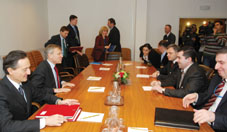Georgian officials upbeat on MAP bid, despite the odds
By Christina Tashkevich
Friday, March 28

Georgian Foreign Minister Davit Bakradze, who was in Brussels this week to meet NATO officials, said Alliance members are still debating whether to give Georgia a Membership Action Plan (MAP) at the April 2–4 summit.
“It is possible a final decision will be made at the last minute of the summit,” Bakradze told journalists on March 26.
Russian opposition to Georgia’s campaign for NATO membership continues to be a focal point for debate both in Georgia and abroad.
Bakradze said Russia has persistently pressured the Alliance over the membership bids by Georgia and Ukraine, which also hopes to receive a MAP next week. He suggested that denying the two countries a MAP, which formally begins the accession process, would represent a Russian veto over NATO expansion plans.
“It’s not only Georgia’s problem, as there is NATO’s interest to make sure whether this organization can make independent decision as it has done before,” Bakradze said.
This week the Russian Foreign Ministry accused Georgia of being behind recent explosions in the breakaway region of South Ossetia—in an attempt, Georgian conflict analyst Paata Zakareishvili suggests, to discredit Tbilisi ahead of the NATO summit.
Dismissing the concerns of some NATO member states over Georgia’s unresolved separatist conflicts, Bakradze said NATO membership would aid Tbilisi in overseeing peace talks.
“Candidate status would give Georgia a guarantee that the settlement of its conflicts will continue through peaceful negotiations,” Bakradze said, adding that if Georgia fails to receive MAP at the Bucharest summit, it will be “a bad signal for separatists and for their supporters.”
Earlier this month German Chancellor Angela Merkel remarked that countries “enmeshed in regional conflicts shouldn’t try to become [NATO] members,” the Bloomberg news agency reported.
Ukrainian President Viktor Yuschenko said Ukraine’s sovereignty is at stake on the NATO issue.
“The issue of whether Ukraine joins NATO or not is simply an issue of whether Ukraine will be sovereign or not,” he told journalists this week.
America’s Bush administration has been the prime backer of extending the MAP to Georgia and Ukraine. US National Security Advisor Stephen Hadley said on March 26 that the US president will be “an active participant” in consultations over Georgia and Ukraine MAPs at the Bucharest summit, adding, “He’s very forward-leaning on the issue.”
“[Bush] believes that NATO should welcome the aspirations of these countries for NATO membership, and that in Bucharest it will result in a clear path forward —it should result in a clear path forward for those countries coming out of Bucharest,” he said.
While saying that the US would continue to press for MAPs for Georgia and Ukraine, Hadley emphasized that the process of NATO membership is “fairly rigorous.”
A MAP can only be offered with consensus from all 26 NATO member states. Germany, France, Greece, Italy, Norway, Spain, Luxembourg, Belgium and the Netherlands have all indicated they oppose giving Georgia and Ukraine MAPs at Bucharest.
